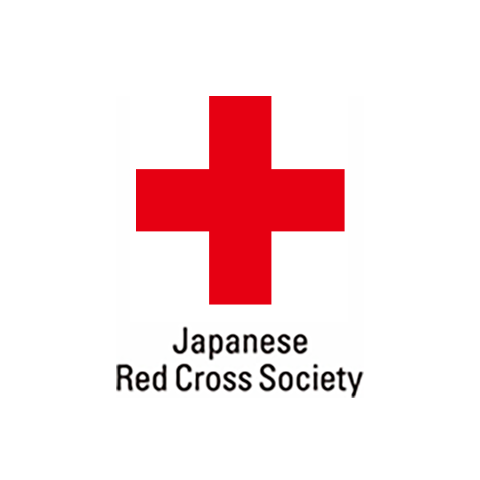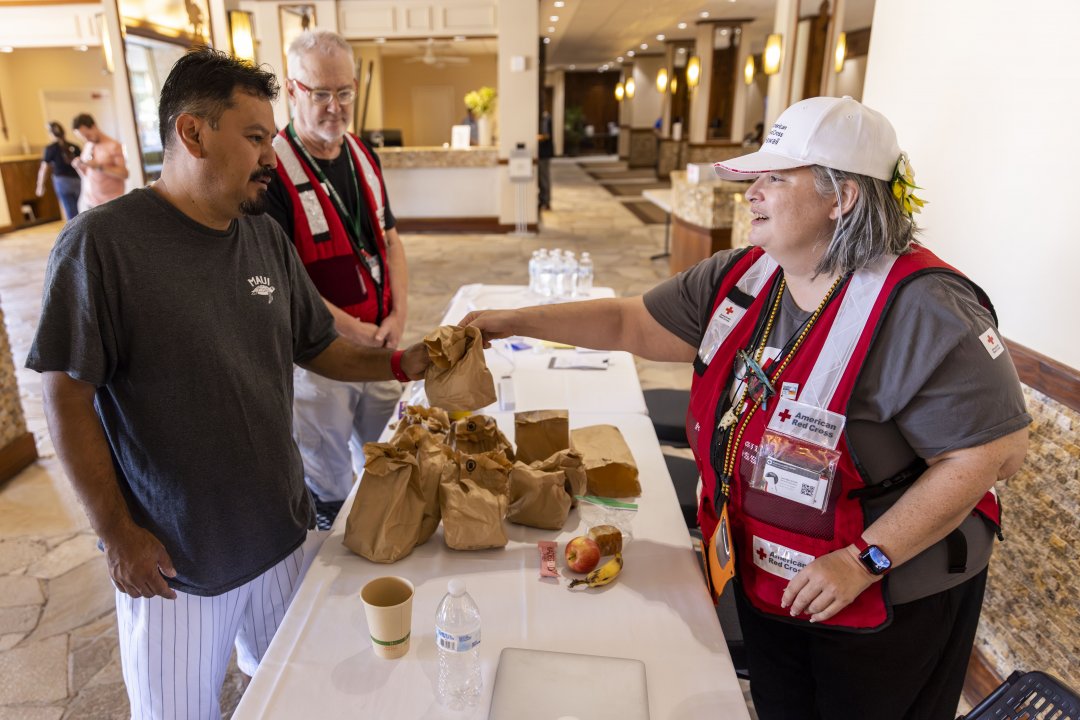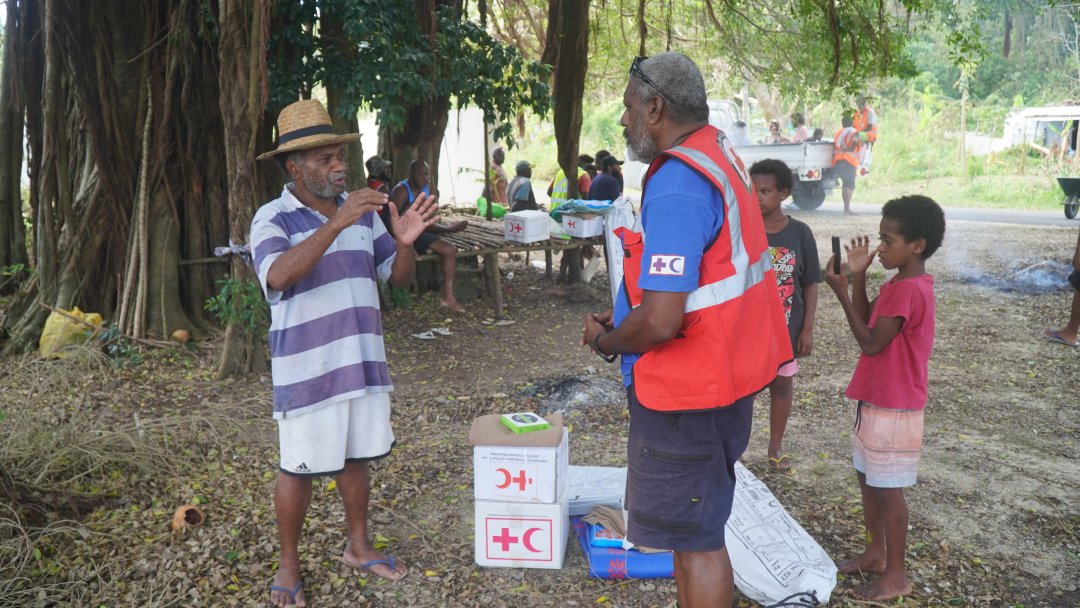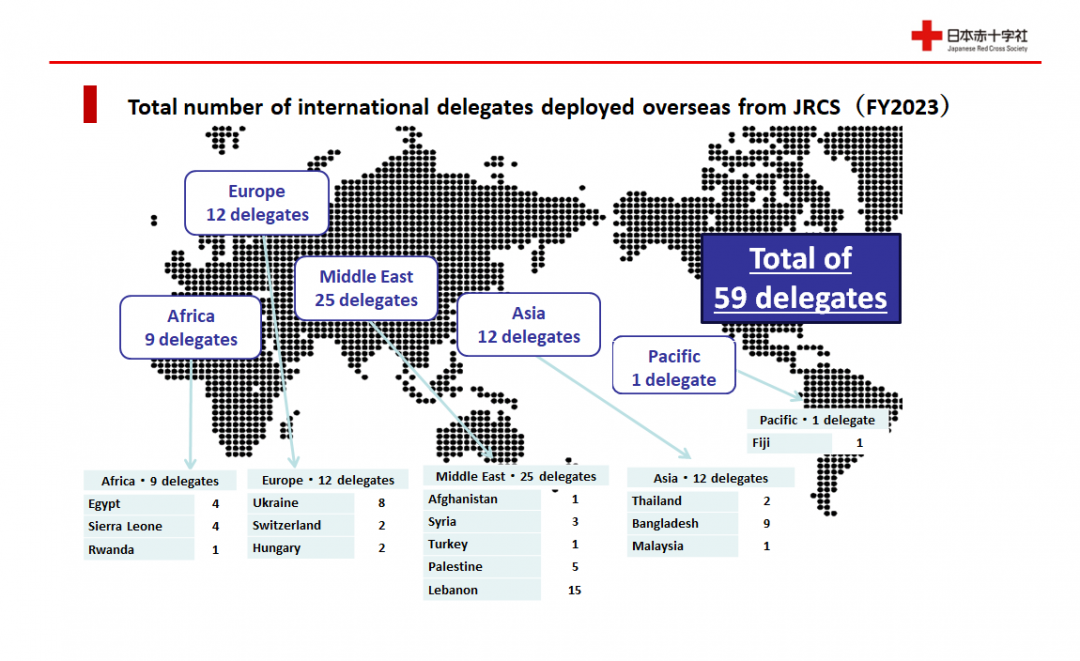Review of International Activities in FY 2023 - No.4 -
Responding to increasingly frequent and severe disasters
In recent years, natural disasters such as cyclones, floods, and droughts due to climate change, as well as unpredictable large earthquakes, have become more frequent and severe worldwide.
This article follows “the Review of 2023 – Summary Part 3” and focuses on the international relief activities of the Japanese Red Cross Society’s (JRCS) particularly in response to the natural disasters and the preparedness, and its human resources that support the international activities by the JRCS.
Turkey-Syria Earthquake Relief Programm
In the early hours of February 6, 2023, a magnitude 7.8 earthquake occurred near the Syrian border in southeastern Turkey. It was an unprecedented large-scale disaster in the region which took nearly 60,000 lives and affected 17 million people in both Turkey and Syria.
In addition to a series of aftershocks and massive destruction over a vast area, the harsh winter conditions posed a huge challenge on emergency life-saving activities. The social infrastructure in the affected areas on the Syrian side was already in a weak state due to the 12 years of conflict. Amidst all these difficulties, both the Turkish Red Crescent Society (TRCS) and the Syrian Arab Red Crescent (SARC) began strenuous relief efforts immediately after the disaster.
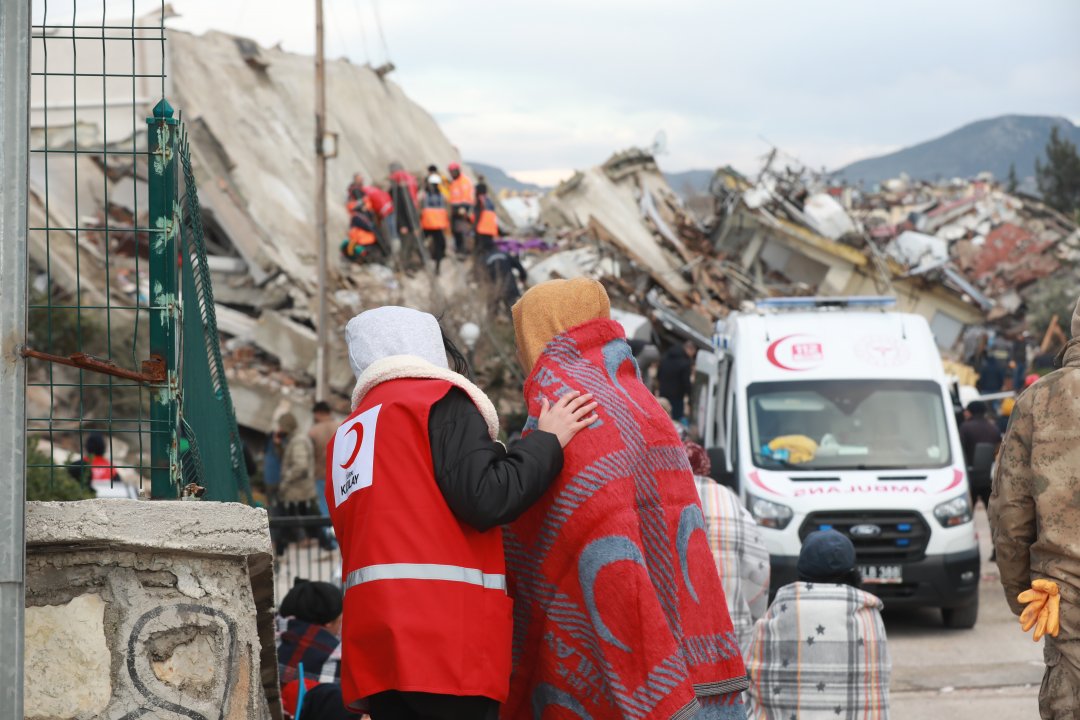
Turkish Red Crescent staff standing by a victim ©IFRC
The TRCS carried out large-scale activities to coordinate and provide food assistance, as it’s mandated by the country’s National Disaster Response Plan, and had provided more than 426 million hot meals by the end of 2023. To meet the immense humanitarian needs, the TRCS extended its efforts to other areas such as Cash assistance, Mental Health and Psychosocial Support (MHPSS), and Livelihood support.
The JRCS, through the International Federation of Red Cross and Red Crescent Societies (IFRC), has provided financial and in-kind support to the TRCS. On the other hand, bilateral cooperation has been enhanced between the two National Societies since the disaster struck, where liaison delegates were dispatched from the JRCS to discuss and coordinate the best way to support the TRCS, as well as to conduct a joint medical/health needs assessment in the field.
Currently, the TRCS mainly operates evidence-based Community-Based Health and First Aid (eCBHFA) and relocation of the Blood donation center, which was damaged by the earthquake. The eCBHFA aims to mobilize the affected communities to recognize and address health risks in their new environments.
Facing the harsh winter ahead, the JRCS provided financial support for the TRCS’s cash assistance as a part of its winterization project in December 2023. In January this year, the JRCS staff visited the disaster-stricken areas and had interviews with beneficiaries who received the JRCS/TRCS’s support. Our close cooperation with the TRCS will be maintained in a longer term.
In Syria, where people have been experiencing more than a decade long conflict and a shortage of various kinds of resources, such as heavy machinery, fuel, and medicines, the International Red Cross and Red Crescent Movement (Movement) is supporting the SARC. Amid the devastation, a medical Emergency Response Unit (ERU) was dispatched to meet the medical needs in the afflicted area with personnel and equipment from Partner National Societies. In addition to providing 1.3 tons of medicines and medical consumables to the ERU, the JRCS deployed 2 pharmacists as well to ensure the proper management of medications and to support the local staff.
Meanwhile, the JRCS deployed a nurse to the IFRC delegation in Syria as a Health coordinator for a year from April 2023 to support the SARC’s strategic planning and programme management in the area of health as well as to strengthen cooperation and collaboration within the Movement and with other organizations.
The JRCS has also contributed in longer-term activities such as a newly launched disaster preparedness and risk reduction programme to increase resilience and to buid a capacity for early recovery for future disasters in the countries in the Middle East.
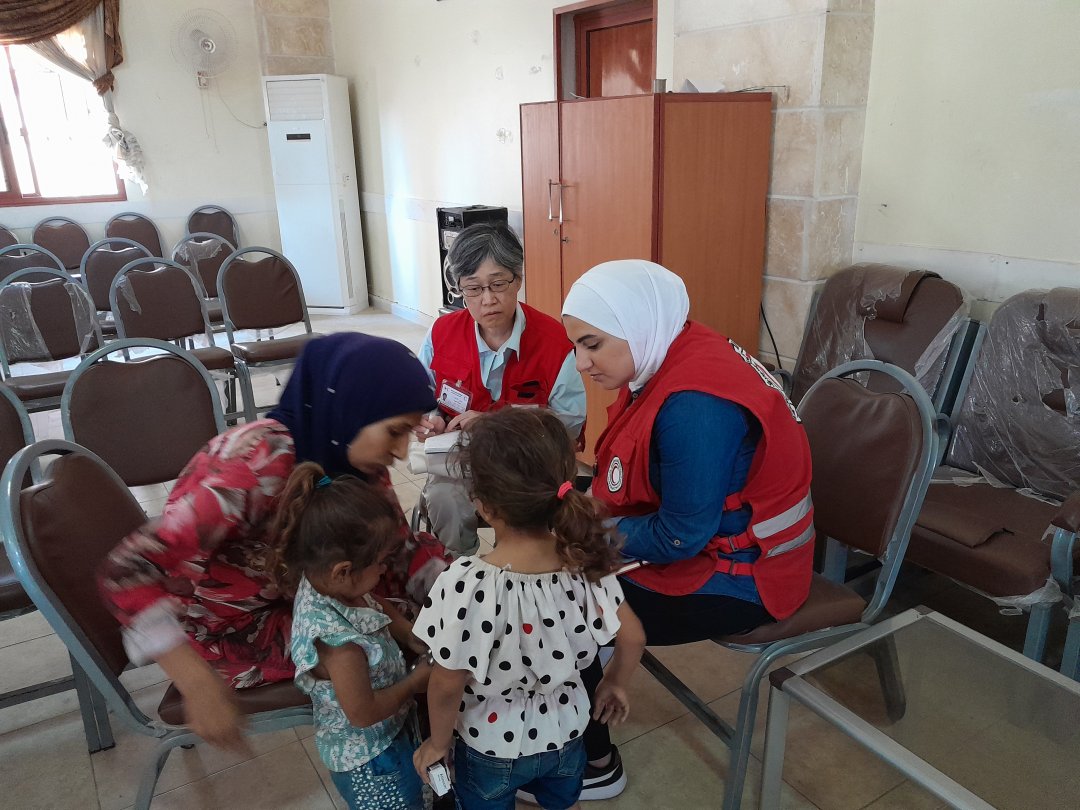
A JRCS nurse as health coordinator listens to the voices of victims ©JRCS
As Syria has been experiencing the 13-year protracted conflict, the number of people in need of humanitarian assistance has reached a record high of 16.7 million people, which account for around 80% of the country’s population.
At the same time, the attention from the international community and aid organizations is once again shifting away from Syria, and the crisis in the country is expected to worsen in the future.
The JRCS will continue to support the people in need, especially the most vulnerable ones in Turkey and Syria.
You can check out the activities by the JRCS and the Movement in this video and the recording of the public event for reporting.
For more details, please visit the “Turkey-Syria Earthquake Relief Programme” page:
https://www.jrc.or.jp/international/results/turkey_syria_jrcs.html
USA - Hawaii Wildfires Relief Programme
On August 8, 2023, a wildfire broke out in the historic town of Lahaina in Hawaii, USA, causing the highest number of casualties in the United States in 100 years and devastating most of the town.
The fire spread quickly due to strong winds, destroyed buildings in the town and killed around 100 people who were unable to escape.
Over 10,000 people living in the island were forced to evacuate temporarily at the time of the disaster, and a half of which, nearly 5,000 people, is still living in evacuation shelters (as of February 2024).
Although removal of debris and assistance for rebuilding houses are underway, more than 3,700 buildings have been damaged and people have been displaced for longer.
More than 1,860 American Red Cross (ARC) staff and volunteers gathered to Lahaina from all over the country for its emergency operations: providing health and medical care, providing safe evacuation shelter and accommodation in tourist hotels, distributing meals and essential goods, setting up a 24-hour hotline call center to provide the MHPSS.
A wide range of activities have been ongoing since the onset of the emergency and support has been provided to the people who are still displaced in hotels. Additionally, recovery assistance for livelihoods has been reinforced such as multi-purpose cash assistance for the affected people.
○ Major Response by the American Red Cross(as of February 2024)
・Served more than 2.54 million meals and snacks.
・Provided more than 1.22 million overnight shelter and hotel stays
・Provided financial assistance: $24.8 million (approximately JPY 3.75 billion )
○JRCS ”USA-Hawaii Wildfires Relief Fund”
・Amount received: JPY 240,344,499
・Recipient of the contributions: American Red Cross
(The ARC plans to provide relief and recovery support and disaster preparedness and risk mitigation activities in Hawaii)
Volunteers serving meals and snacks at a hotel lobby ©ARC
For more details, please visit the “USA - Hawaii Wildfires Relief Programme” page:
https://www.jrc.or.jp/international/results/America_Hawaii_fire2023.html
Morocco Earthquake Relief Programme
On September 8, 2023, a magnitude 6.8 earthquake struck a mountain range approximately 75 km from the city of Marrakech in Morocco.
The tremors were recorded in a broad geographical area, affecting neighboring countries including Portugal and Algeria, causing devastating damage in rural areas that were difficult to access. Around 60,000 houses were destroyed or damaged, and about 3,000 people have lost their lives.
It is estimated that 380,000 people were temporarily displaced at the time of the earthquake, while many of them were reportedly spending nights outside in dangerous places without shelter for fear of aftershocks. Furthermore, as some of the affected areas were at extremely high altitudes, over 1,500 meters above sea level, it was urgently needed to prepare for the severe cold as many people were still living in tents or emergency shelters.
In addition, there was an increased need for water, sanitation and hygiene (WASH), and food assistance while many villages experienced a lack of latrines and stockpiled supplies.
Immediately after the earthquake, the Moroccan Red Crescent (MRC) mobilized its staff and volunteers to provide life-saving support, including search and rescue, evacuation support, transportation, and first aid for injured people.
For now, the MRC has provided humanitarian assistance to more than 62,476 people (as of February 2024).
Moving from emergency relief to medium and long-term support, the MRC will focus more on preparedness for the harsh winter and WASH support, responding to the needs by distributing thermal blankets and tents, repairing water sources, and setting up latrines and showers.
○Major response by the Moroccan Red Crescent (as of March 2024)
WASH support:
・138 water points installed or repaired in 16 regions
・133 toilets, 107 showers, and 23 incinerators installed
・5,411 hygiene kits distributed
・3,136 people joined the hygiene promotion activities
○JRCS “Morocco Earthquake Relief Fund”
・Amount received: JPY 257,759,232
・Recipients of contributions: IFRC Emergency Appeal
( Relief and recovery support provided by the MRC and the IFRC)
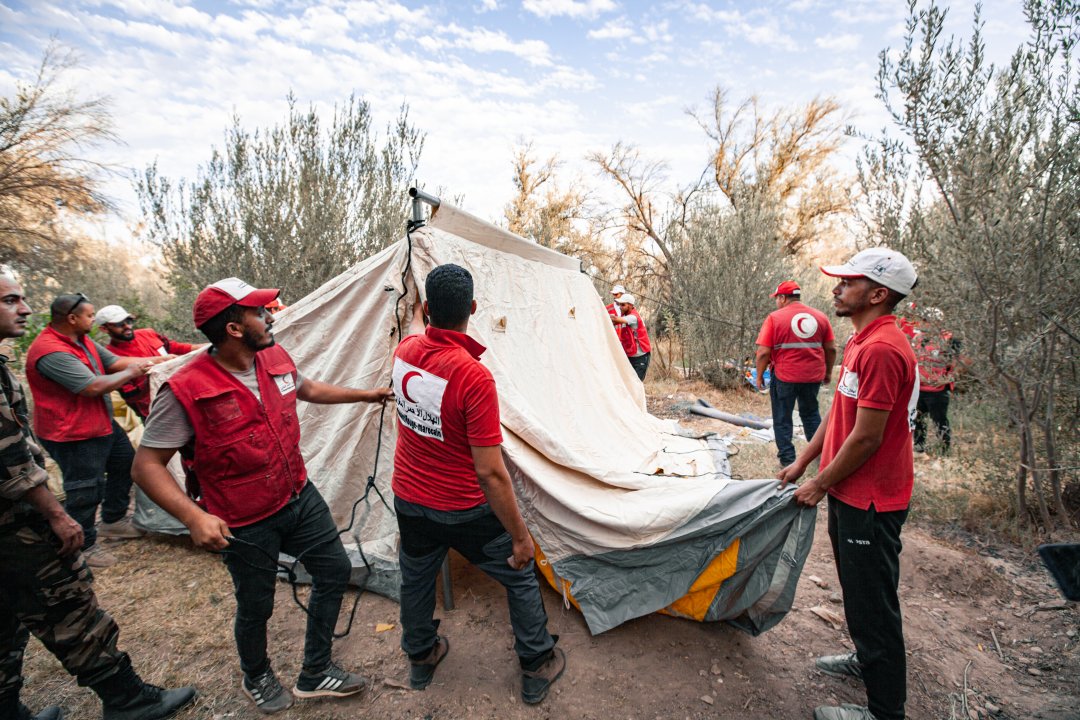
MRC staffs setting up tents ©IFRC
For more details, please visit the “Morocco Earthquake Relief Programme" page:
https://www.jrc.or.jp/international/results/Morocco2023.html
Libya Flood Relief Programme
On September 10, 2023, the Storm Daniel hit Libya in North Africa, causing widespread flooding in the eastern part of the country and one-third of the country was flooded.
As the two dams burst due to the heavy rainfall, a large amount of water flowed into a small dry river that led to the sea, causing flooding that reached up to 3 meters high, sweeping entire neighborhoods, including buildings and residents, into the sea.
It has caused extensive damage to buildings, roads, health facilities, and water systems, with more than 4,300 casualties and around 8,000 people missing reported (as of December 2023).
While temporarily displaced people have gradually been returning to their homes, access to essential services such as healthcare and water infrastructure remains difficult, and prevention of communicable diseases has been a major concern.
The Libyan Red Crescent Society (LRCS) helped the evacuation of stranded people and the search for missing people since the immediate aftermath of the disaster when access was difficult. About 730 volunteers have been involved in the provision of essential relief supplies, water, sanitation and hygiene kits and MHPSS.
The LRCS has also been working with the International Committee of the Red Cross (ICRC) to help restoring family links (RFL) and transport dead bodies. They also provided forensic identification of the dead bodies as needed to ensure that missing persons were properly identified.
○Major response by the Libyan Red Crescent Society ( as of October 2023)
・Distribution of basic supplies: 47,767 non-food items, 75,095 food parcels, 601 first aid kits
・MHPSS:7,268 people
・Dignified management of the Dead: 2,317 cases
○JRCS “Libya Flood Relief Fund”
・Amount received: JPY144,325,094
・Recipients of contributions: IFRC Emergency Appeal and ICRC Appeal
( Relief and recovery support provided by the LRCS, the IFRC, and the ICRC)
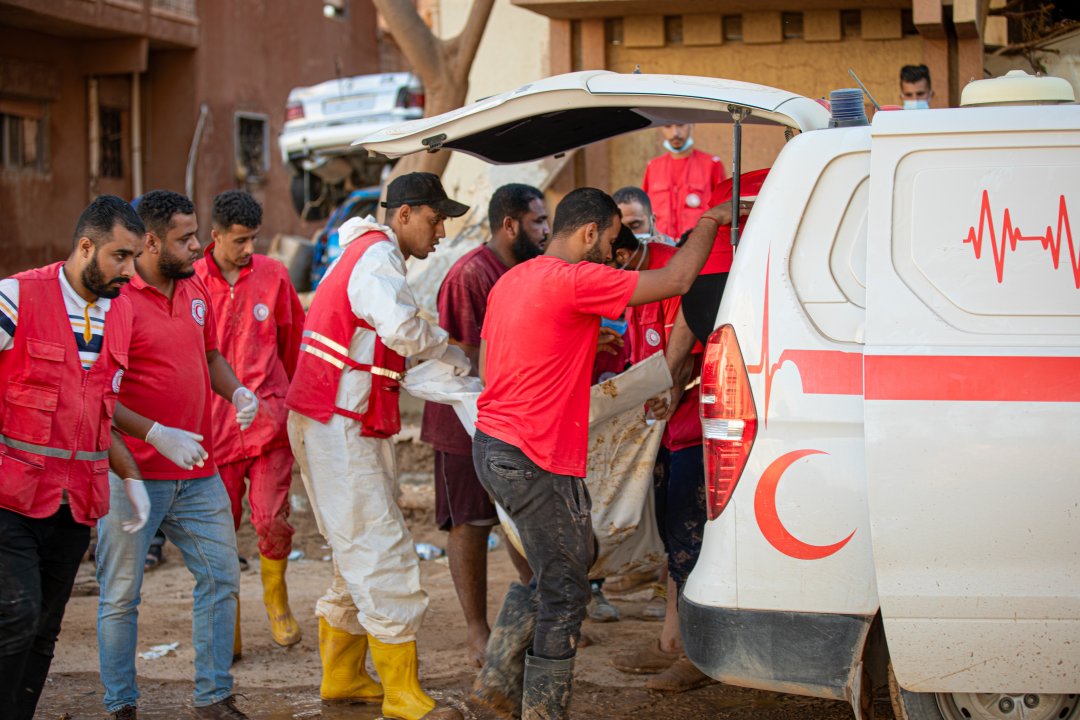
Transporting injured person by ambulance service ©LRCS
For more details, please visit the “Libya Flood Relief Programme" page:
https://www.jrc.or.jp/international/results/Libya2023.html
Afghanistan - Herat Earthquake Relief / Humanitarian Crisis Response Programme
On October 7, 2023, a magnitude 6.3 earthquake occurred in Herat province, western Afghanistan. Several aftershocks of similar magnitude followed, causing the collapse of many mud-brick houses, killing at least 1,480 people and injuring more than 9,000 people.
The country has been facing a complex humanitarian crisis, including severe drought, economic collapse, decades of conflict, concerns over protection of women and children, and population movement.
Two-thirds of the country's population - 28.8 million people – are in urgent need of humanitarian assistance. As the humanitarian situation worsens, the country has faced a series of man-made and natural disasters, including two major earthquakes in consecutive years ( Khost-Paktika Earthquake in 2022 ).
The Afghanistan Red Crescent Society (ARCS) has branches in 34 provinces across the country, and one of the branches in the affected areas started relief activities immediately after the earthquake. So far, the ARCS has supported 7,000 households and 49,000 people (by the end of December 2023) through providing relief items, food, shelter, cash assistance and mobile healthcare services.
From December 2023, the JRCS dispatched its health delegate (nurse) to Kabul for three months as the IFRC Rapid Response personnel (Health Coordinator), in addition to its cash contribution for the RCRC activities through the IFRC Emergency Appeal to support the affected population. Her major task was to provide technical assistance and coordination in the health and medical sectors, including mobile health units in the affected areas.
The ARCS continues to provide comprehensive support to vulnerable people, especially women, children, the elderly and people with disabilities, who need support.
○Major response by the Afghanistan Red Crescent Society
2023 Herat Earthquake (as of December 2023)
・Provision of shelter and essential items: 14,700 people
・Food distribution:14,000 people
・Health and medical support: 15,000 people
・MHPSS: 7,600 people
・Cash assistance: 12,900 people
Humanitarian crisis (as of August 2023)
・Health and medical support: 1 million people
・Distribution of food and basic supplies: More than 500,000 people
・WASH support: More than 115,000 people
・Distribution of winterization kits: 68,000 people
・Cash assistance: 112,000 people
○JRCS “2023 Afghanistan Herat Earthquake Fund”
・Amount received: JPY60,664,780
・Recipients of contributions: IFRC Emergency Appeal
( Relief and recovery support provided by the ARCS and the IFRC)
*JRCS continues its fundraising campaign as follows:
"Afghanistan Humanitarian Crisis Response Fund." (in Japanese)
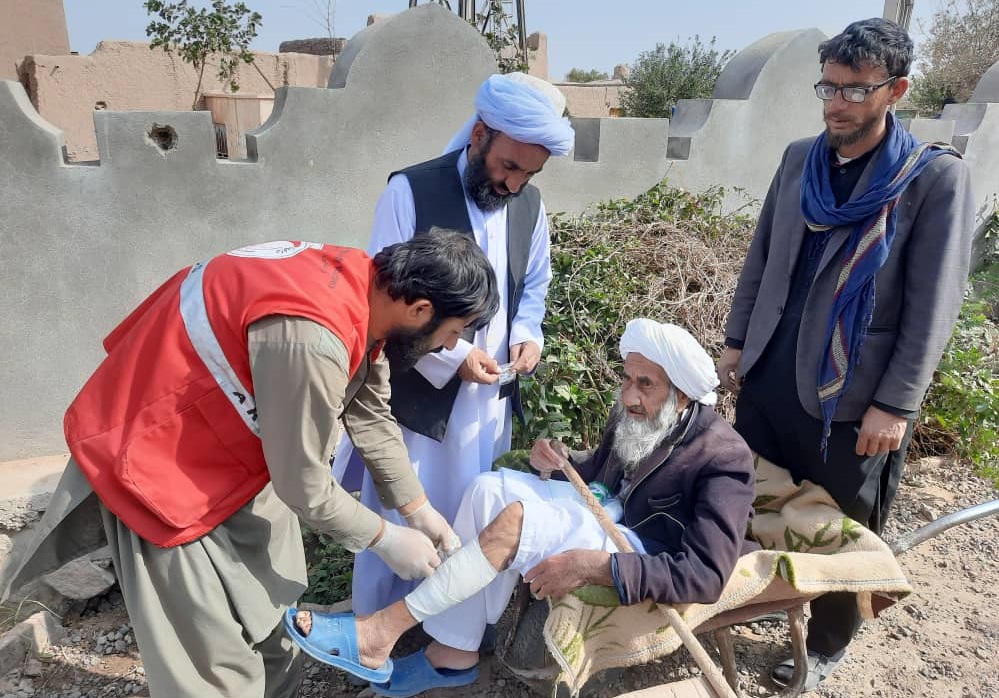
Mobile health unit team treating an injured man ©ARCS
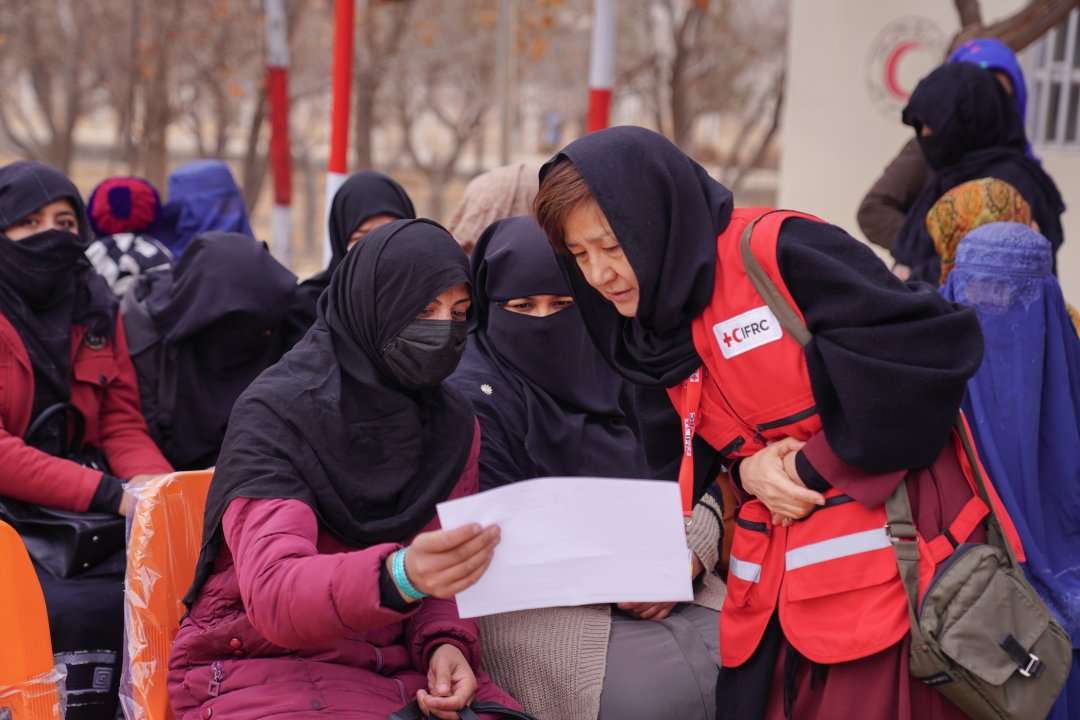
The JRCS health delegate talks with a woman supported by the ARCS ©IFRC
For more details, please visit the “Afghanistan Herat Earthquake Relief " page:
https://www.jrc.or.jp/international/results/AfghanistanEarthquake2023.html
For more details, please visit the “Afghanistan Humanitarian Crisis Response Programme" page:
https://www.jrc.or.jp/international/results/afghanistan_jrcs.html
Strengthening Capacities of Red Cross and Red Crescent National Societies in Asia Pacific in Emergency WASH Response and Preparedness
The Asia-Pacific region is one of the most disaster-prone regions in the world. In 2023, cyclones and typhoons struck vast areas in the region, such as Bangladesh, Myanmar, the Philippines, and Vanuatu.
In particular, as response to heavy rains and floods account for 85% of the 48 emergency relief operations, it was challenging for many countries, including Japan.
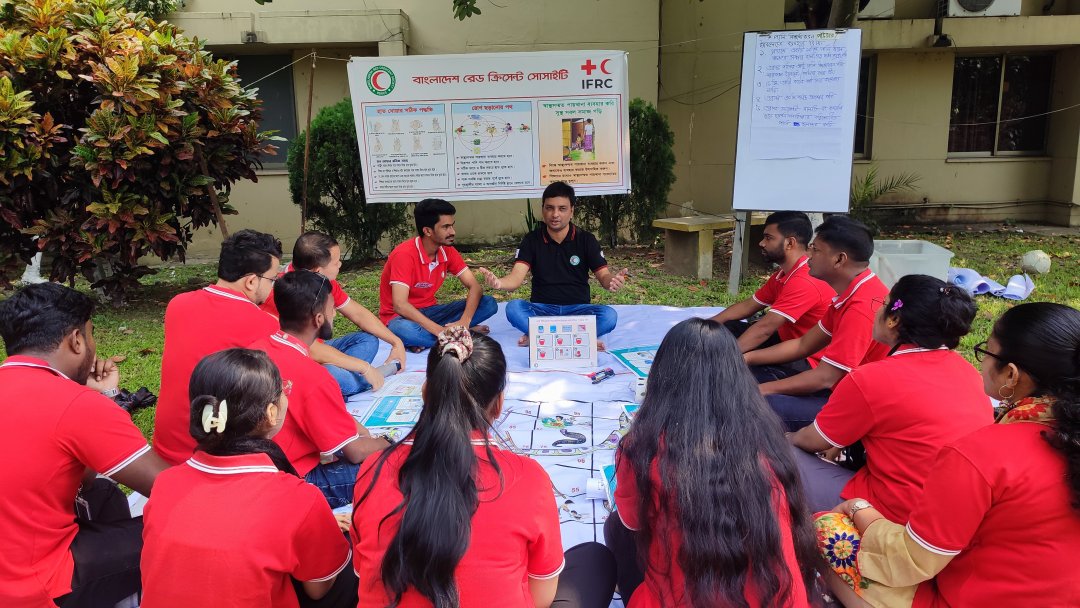
Participants rained in proper hygiene management in case of disaster (Bangladesh) ©BDRCS
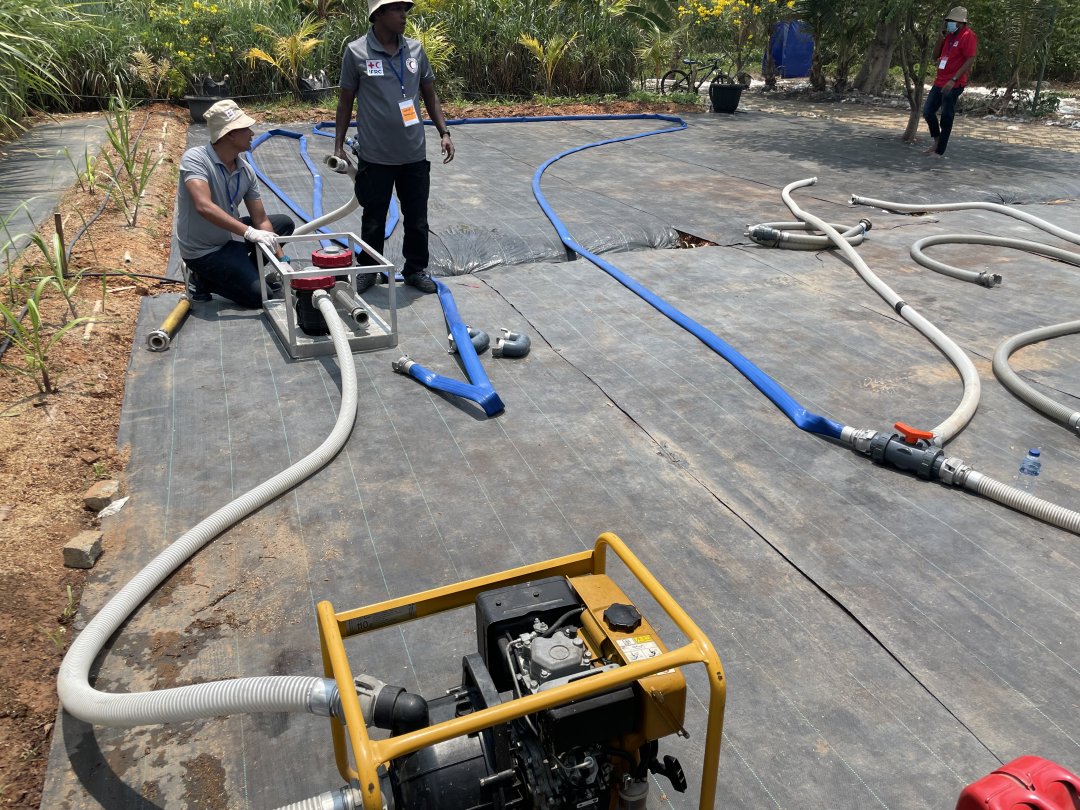
During the training, trainees install and operate the water purification system ©IFRC
A small-scale water and sanitation disaster response kit includes water tanks, water purification unit and agents, water quality testing kits, materials for installing rapid latrines, hygiene education materials, etc., and has been prepositioned at the NSs in this region to enable adequate water supply and sanitation activities when a disaster happens. The preposition of the equipment is accompanied by a series of training courses for local staff and volunteers on how to operate and maintain the kit, as well as how to do water quality testing and hygiene promotion.
In 2023, the Bangladesh Red Crescent Society held training on equipment maintenance and hygiene education, while the Malaysian Red Crescent Society held training on emergency response planning and water quality testing.
A joint training programme was also conducted with 133 participants from seven countries in the region (Bangladesh, Indonesia, Malaysia, Maldives, Nepal, Singapore, and Myanmar).
Prepositioning of emergency relief items at the IFRC Asia-Pacific Regional warehouse
The JRCS has also prepositioned ten emergency relief items, such as blankets, family tents, hygiene kits, and mosquito nets, in the warehouse of the IFRC Asia Pacific Regional Office in Kuala Lumpur, Malaysia.
It is based on the IFRC regional stock strategy, aiming at delivering relief items for 5,000 households within 48 hours of the disaster, and for 20,000 households in the next two weeks, from the warehouse to the affected areas in the Asia-Pacific region.
The JRCS has stockpiled hundreds of thousands of items, and is dispatching and replenishing them daily as needed.
In fiscal 2023, when many cyclones and floods were experienced, relief items were dispatched to 11 countries, including the Philippines, Vanuatu, Myanmar, and Bangladesh.
In 2023, the following relief items were dispatched :
・Blanket 10,653 pieces
・Hygiene kit (soap, towels, etc.) 6,053 kits
・Jerry can 12,506 pieces
・Kitchen set 3,928 kits
・Shelter tool kit 1,560 kits
・Taupaulin 9,202 pieces
・Family tent 195 units
・Warehouse tent 2 units
Distributing shelter tool kits and hygiene kits to residents affected by the cyclone in Vanuatu ©VRCS
Health Emergency Response Unit (ERU)
To prepare for emergencies and large-scale disasters overseas, the JRCS holds an "Emergency Response Unit" (ERU) for health and medical care. Emergency Response Units (ERUs) are teams of specialized personnel and equipment that can deploy at short notice to sudden and slow on-set disasters.
In fiscal year 2023, although there were no ERU deployments led by the JRCS, it responded to various emergencies in cooperation with the Movement partners. The JRCS deployed an Interagency Emergency Health Kit of medicines and medical supplies and its trained pharmacists to support Emergency Clinic ERU activities led by the partner National Society. In addition, the water and sanitation module, which is a part of the ERU equipment and materials, was also used to assist people affected by the Noto Peninsula Earthquake in Japan in January 2024, providing water and sanitation services in the affected areas.
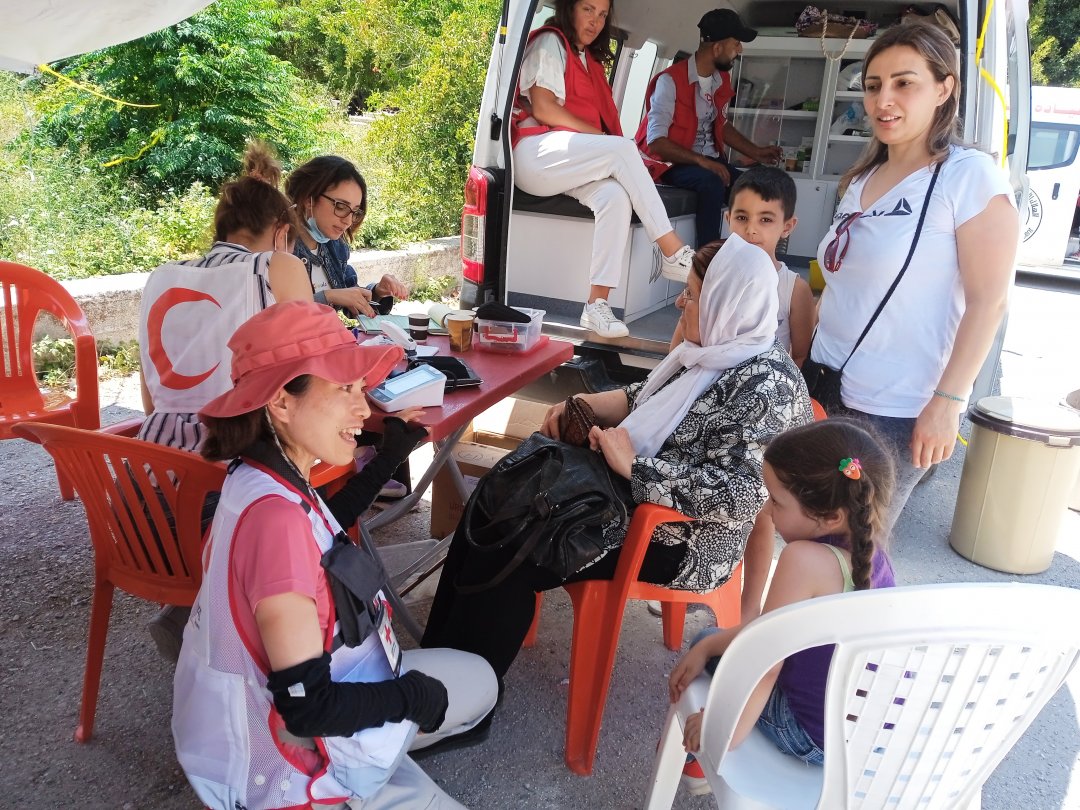
|
March to May 2023 Dispatch of two JRCS pharmacists and 1.3 tonnes of medicines and medical supplies to support the Emergency Clinic ERU led by the Finnish Red Cross in Syria: This has helped meet the urgent health needs in the areas affected by the Turkey-Syria Earthquake. |
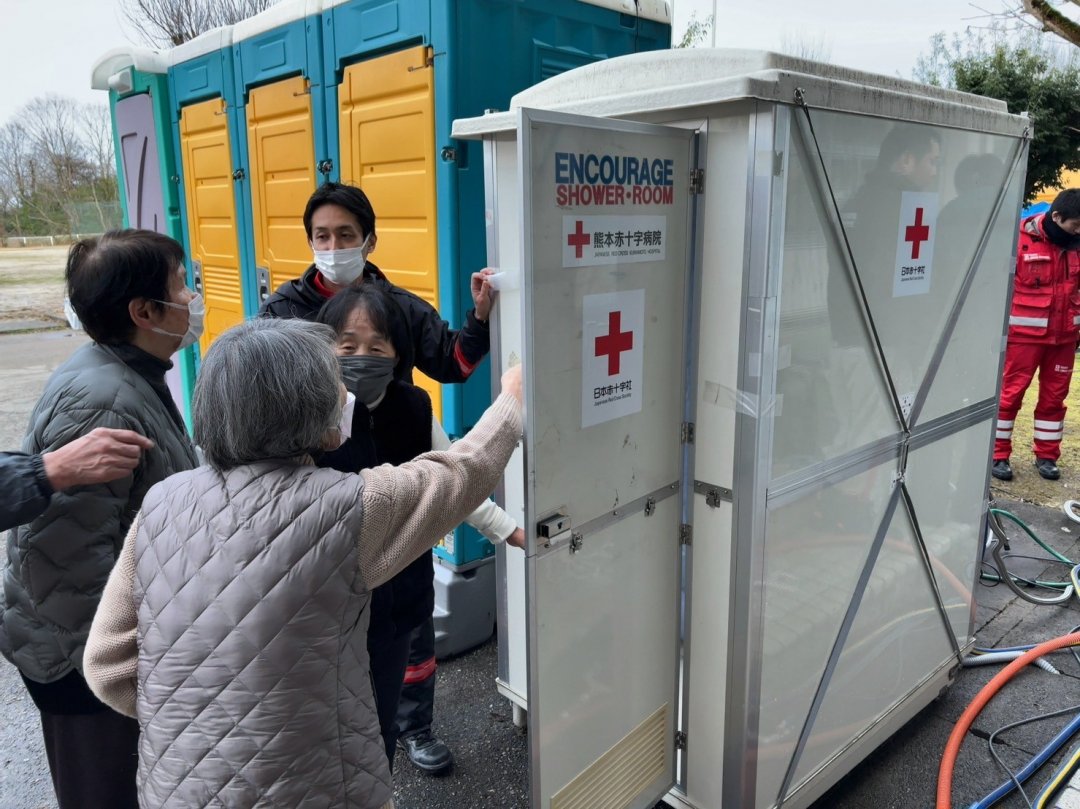
|
January to March 2024 Setting up hand washing facilities, showers and washing machines at the evacuation centres (two elementary schools) in the affected areas in Nanao City, where water supply was cut off after the Noto Peninsula earthquake, using the water purification and heating equipment. |
Health ERU training
When the deployment of the Emergency Clinic or Emergency Hospital ERU is activated, trained JRCS experts from Japan are dispatched to the disaster area to quickly provide medical relief. The JRCS responds to disasters at national and international levels, and when operating overseas, staff from not only the Red Cross National Society in the disaster area but also from other National Societies that have come to provide assistance from other countries become part of the team, bringing their own strengths and working together to support the affected people.
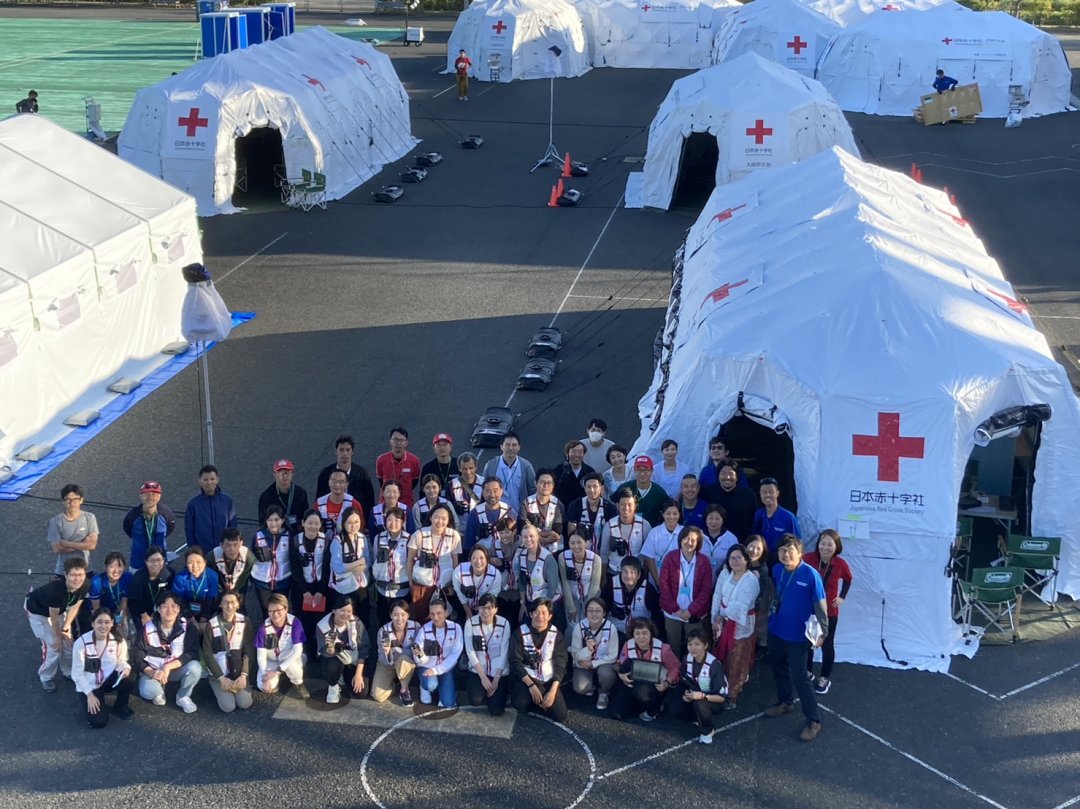
In October 2023, the Health ERU training was held in Hyogo Prefecture. A total of 31 participants from Hong Kong, South Korea, Singapore, Canada, Norway, Germany, and Finland, in addition to participants from JRCS facilities across Japan, learned the principles of humanitarian assistance, cooperation with related organizations, and other essentials for conducting the best possible healthcare support activities for disaster victims as a team through lectures and simulation exercises.
JRCS International Delegates
The Japanese Red Cross Society (JRCS) deploys skilled international delegates abroad to address the humanitarian needs in the world. There are 450 trained international delegates registered, including doctors, nurses, logisticians, and other professionals. They provide various support in the field such as medical services and assist in strengthening resilience in communities in close coordination and cooperation with the staff and the volunteers from the local Red Cross/Red Crescent National Society.
Every year, the JRCS deploys around 50 - 80 international delegates to the fields abroad based on humanitarian needs. During the times of the pandemic of COVID-19, it responded by providing international assistance remotely from Japan via online instead of sending its delegates. However, as restrictions on overseas travel eased, the number of international delegates dispatched has increased and gradually recovered. In fiscal year 2023, 59 international delegates were deployed in 15 countries.
Voice from a JRCS international delegate working in the field
In July 2023, Dr. Kasuga of the Japanese Red Cross Wakayama Medical Center was deployed to Lebanon to teach the knowledge and skills about ultrasound examinations to local doctors working at a Palestinian refugee camp in Lebanon.
Dr. Kasuga recalls that although she struggled to get used to how to work and interact with local people on her first overseas mission, she was delighted when the local staff thanked her for coming and said, “We are very grateful that you came.”
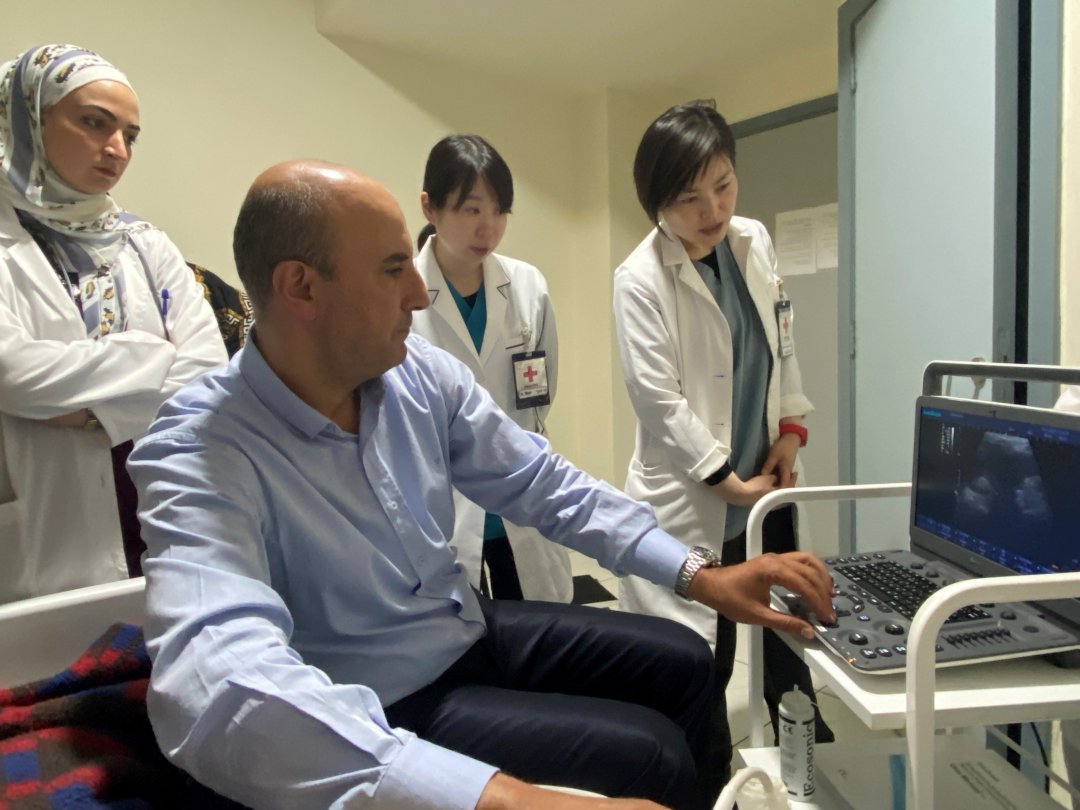
JRCS doctors watch as a local urologist gives ultrasound guidance to a trainee doctor.
The JRCS website features the "Voices of international delegates from the field," showcasing their reflections on their roles and activities overseas. Information about the JRCS's international activities and delegates is also available on our Website for International Delegates. For more details, please visit our website.
